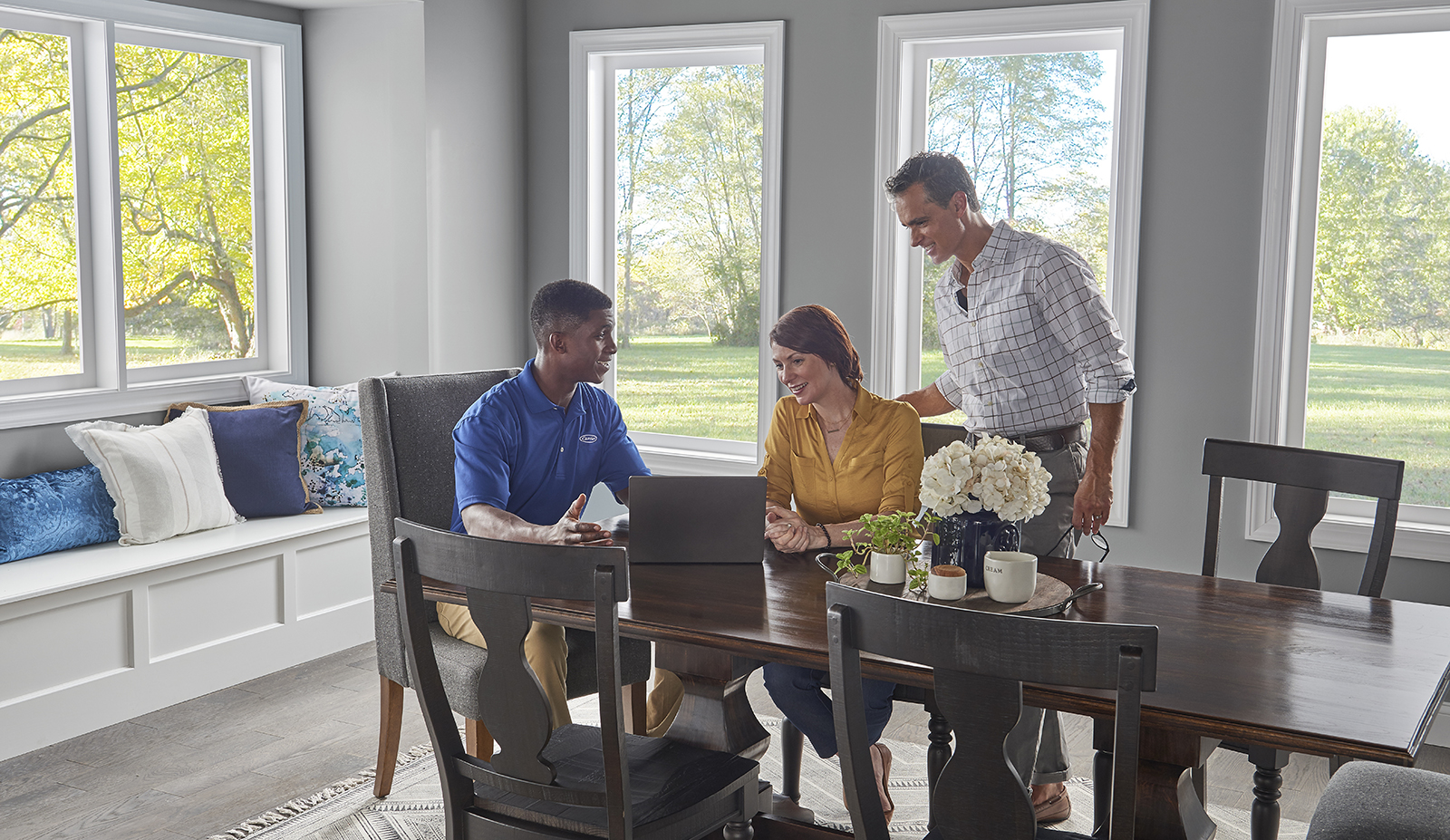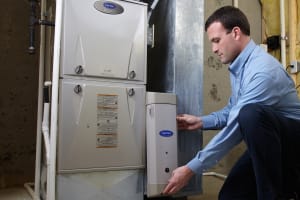How Often to Change Air Filters in Your Home
Your central AC system keeps you cool and comfortable every summer by moving a lot of air, both inside and outside your home, which is why air conditioner maintenance is important. Inside your home, there is an air handler unit that draws indoor air across the evaporator coil where the heat and moisture is extracted, leaving the indoor air cooler and more comfortable. At the same time, the cool air is re-circulated back to your home. Your air conditioner system’s air filter is typically located inside the air handler unit or just outside the cabinet in the ductwork. It traps airborne pollutants from the air coming into the system which can help keep your cooling system components cleaner and maintain improved quality of the air you and your family breathe.

How Often Should You Change Your Air Filter?
To help protect your air conditioner’s lifespan, and improve comfort, regular AC filter replacement is important. Here’s why:
- Energy efficiency: A dirty or clogged air filter can restrict airflow through the system. Because the system will have to work harder to maintain your comfort, it uses more electricity, which can increase your energy bills. According to the Department of Energy, replacing a dirty, clogged filter can increase your system’s efficiency by 5 – 15%. 1
- Comfort: Knowing how often to change air filters can affect your comfort. A neglected, dirty air filter can cause the heating and air conditioning system to struggle to keep you comfortable.
- System reliability: Because a clogged, dirty filter can make your fan motors and other components work harder, ignoring routine filter maintenance can shorten the life of your HVAC system .
Now that we’ve established the importance of filter maintenance, we should also point out that answering the question “How often should you change your air filter?” does not have a one-size-fits-all solution. Some should be replaced every 30 to 60 days. Others might last 6 months to a year.
The answer depends on factors such as how often you use the system, the type of filter, whether there are any pets in the home, and your personal habits such as having smokers in the house, use of a wood-burning fireplace, and more. For your comfort and well-being, and potentially to help save you money in the long run, regular filter inspections and replacement should be a part of your routine air conditioner maintenance.
1 See Department of Energy
Types of Air Filters
The general recommendation for how often to change air filters can range from every 30 days to every year. Two of the determining factors for a filter’s lifespan are the type and quality of the filter that is being used.
- Fiberglass filter: Fiberglass filters are typically the least expensive option. They are usually about 1” thick and provide basic level filtration. They are disposable filters that should be checked and probably changed about every 30 days.
- Polyester / pleated filters: Pleated filters are available in different widths, but all of them are typically more effective at removing airborne pollutants than standard fiberglass. 4-inch wide pleated filters supply much improved filtration compared to standard fiberglass types and even 1-inch pleated versions. These filters also have much higher surface area and can potentially be left in place between 3 months and a full year before cleaning or replacing.
- Washable air filters: Washable filters are less common. They actually become more effective at filtering as airborne particles build up on their surface. Instead of replacing, these filters are removed, cleaned, and then placed back into the system.
For each of the above types of filters, you can compare their effectiveness by checking their MERV rating. MERV is an acronym for Minimum Efficiency Reporting Value and is a rating of the filter’s ability to trap airborne particles as well as its ability to allow proper airflow. MERV ratings can be between 1 and 16, with 16 providing the best filtration.
Factors That Impact How Often Should You Change Your Air Filter
How often should you change your air filter? The lifespan of an air filter is also impacted by the occupants of the home and the characteristics of the home itself. Because an air filter is one of the home’s first lines of defense against pollutants and allergens, it’s important to have a feel for how your home and your actions can affect the timeline for replacing the filter.
Quality of the Air
Your activities and your home’s location both can have an effect on indoor air quality. Some examples that can reduce indoor air quality include:
- Smoking in the home
- Burning scented candles
- Using a wood-burning fireplace or stove
- Cooking
- Use of personal care products and cleaning agents
- Location near new construction
- Poor outdoor air quality/smog
If one or more of the above apply to your home, a good answer to “how often to replace air filter” is “at least once every 30 days”.
Asthma or Allergies
If you have allergy sufferers in the home, or individuals with asthma, you know that these people can be more sensitive to airborne particles such as dust mites, pollen and mold spores. Selecting a good quality filter with 12 – 16 MERV to remove a high percentage of offending particulates. Be sure to check your filter at a minimum of once per month.
Pets in the Home
With animals in the home, the question of how often to change air filters will depend upon a number of factors, including the number, size, and hair length of the animal(s). Pet dander and hair increases the volume of airborne materials that an air filter must capture. Pets also can bring additional bacteria, viruses, insects, dirt and dust into the home. Frequency of filter checks and how often to replace your air filter shouldn’t vary too much if you have just one pet living in the home. If this is the case, follow the recommendations provided by the filter manufacturer. With multiple pets in the home, we recommend checking the filter with more frequency, at a minimum of once every 30 days.
Size of the Home
A split HVAC system in a larger home will circulate higher volumes of air, and therefore trap higher volumes of airborne particles in its filter. This means that air filters in larger homes should be checked, cleaned and replaced with more frequency than those in smaller homes.
How Often You Use the Unit
The more often a heating and cooling system is used, the more air that will be pumped through the air filter, and the more pollutants that will be stirred up and trapped. If the home is in a moderate climate and the air conditioner is used infrequently, the air filter will not need to be changed as often. The same is true for vacation homes. An air filter in a vacation home can last much longer than the average residential home due to its infrequent use.
The opposite is true for air conditioners that are used more than average or if the customer utilizes continuous fan mode. In the heat of summer in Florida, when the air conditioner is running all the time, the filter will likely need to be changed more often than the recommended amount.
Ultimately, the decision on how often to check, clean or replace your HVAC system’s air filter is up to you. Understanding all of the variables involved will help you make a good choice on how often to change AC filters in your home.
Find a Carrier Dealer To Help With How Often To Change Air Filters
If you would like help knowing how often to change air filters, you can always ask your local Carrier dealer. Your local Carrier HVAC dealer offers the expertise on all things HVAC, including air filter related questions. Check out our guide on how to change air filters if you need help on performing air filter replacement.
FAQs On How Often Should Air Filters Be Changed
- Find out How Do Air Conditioners Work
- Learn about Cleaning AC Coils
- Why is My Air Conditioner Not Cooling?
- Wondering "What Size Air Conditioner Do I Need?"
- Troubleshoot an Air Conditioner tips
- Why you should get an AC Tune Up




